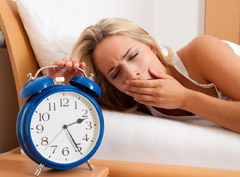Sleep Disorder Center
Located at Jersey Community Hospital, the JCH Sleep Center is open Monday-Friday. Our Sleep Lab is staffed with Registered Polysomnographic Technologists and features a computerized monitoring system that includes state-of-the-art sleep disorder digital equipment.
If you have trouble sleeping – or staying awake during the day – take our Sleep Apnea Quiz to see if you have symptoms that might indicate a sleep disorder.
Monitoring Your Sleep
Monitoring your sleep during an overnight sleep study is usually the only way to tell for sure whether or not you have a sleep disorder. A sleep study records how your lungs, heart and other parts of your body function while you’re asleep. The testing is painless, risk-free and usually takes one full night. It is done in the JCH Sleep Lab.

What about cost?
Sleep studies are considered an eligible charge by most private paid insurances, Medicare, and Medicaid.
What are the symptoms of a sleep disorder?
People who have sleep disorders may experience the following:
- Morning headaches
- Restless sleeping
- Falling asleep at inappropriate times
- Gasping or awakening with shortness of breath
- Snoring
What should I do if I think I may have a sleep disorder?
Talk to your family physician, as this test can only be done with a doctor’s order. Your doctor does NOT have to be on staff at Jersey Community Hospital in order to have the test done.
During Your Sleep Study
You will spend a night in a private room inside our Sleep Center. The technician will apply special sensors that will record the activity of your heart, lungs and brain, the movements of your muscles, the air flow from your nose and mouth, and the level of oxygen in your blood. In addition, your body movements will be videotaped. Snoring, talking or other noises you make while you’re asleep are recorded. A technician watches the recording on monitors all night to observe you and make sure there are no problems with the equipment. If you have severe sleep apnea during the night, the technician may provide a device called CPAP that keeps your air passage open and assists your breathing.
After Your Sleep Study
The results are analyzed in detail and interpreted by a physician trained in sleep medicine. The report will then be sent to your physician. The information the study provides will be used by your physician to the best treatment to use for your sleep disorder. Preventing and controlling sleep apnea can improve your quality of life and discourage serious health problems, such as high blood pressure, stroke or heart disease. In addition, daytime sleepiness can cause loss of concentration, loss of productivity, crashes and other accidents.
Contact the Sleep Disorder Center by calling (618) 498-8394.
